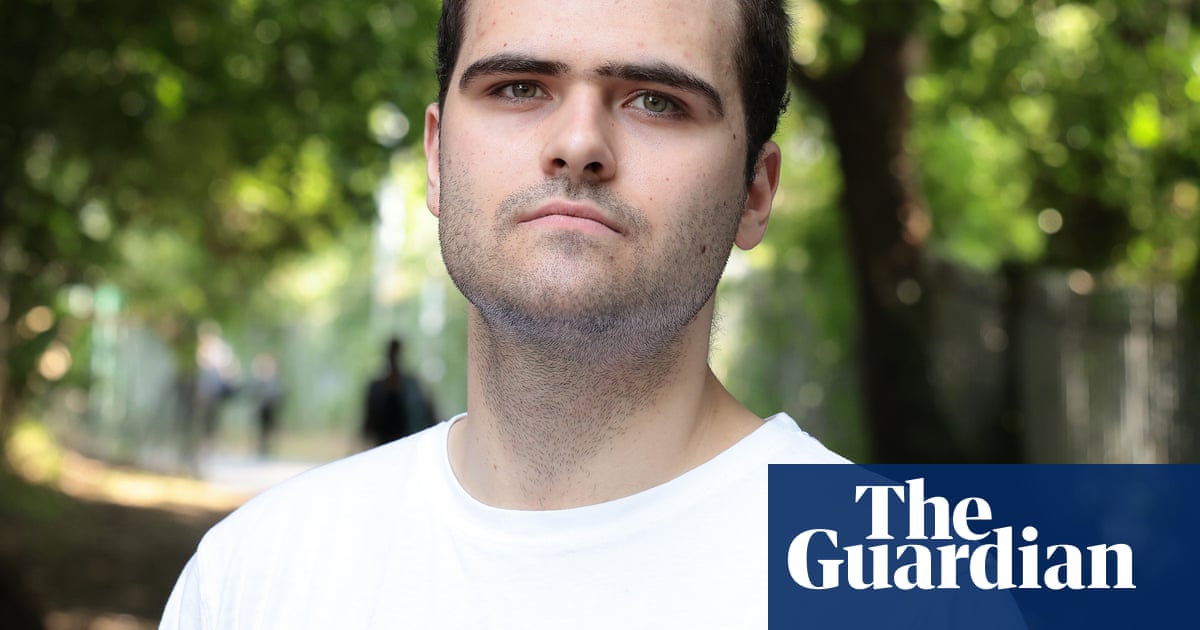The Met police operation in which officers raided a Quakers meeting house also resulted in the arrest of an autistic climate activist at his supported accommodation, the Guardian can reveal.
Joe Booth, 23, had been in bed when seven police officers arrived at the flats for vulnerable adults in New Barnet, northLondon, to arrest him on suspicion of conspiracy to cause a public nuisance.
The arrest appeared to be linked to his attendance at weekly meetings of Youth Demand, an off-shoot of Just Stop Oil, that describes itself as a nonviolent protest movement.
The evening before his arrest, up to 30 Met officersbroke down the front door of a Quaker meeting house to arrest six female members of the groupin what appears to be a linked raid.
It is thought to be the first time that police had forced their way into a place of worship used by the pacifist Quakers movement. The raid has been heavily criticised by politicians, campaigners and religious groups.
Booth, who claims to have never been involved in disruptive protest and to have previously attended one peaceful Youth Demand march on Downing Street, said the arrest has left him with post-traumatic stress disorder.
He said the officers who arrested him appeared to be surprised that he lived in supported accommodation for vulnerable adults.
After a support worker let the police into his flat, an officer had grabbed his arm, he claimed, and asked whether “I need to put you in handcuffs” before reading him his rights.
“They did not know until they turned up that I lived in supported accommodation,” claimed Booth, who is a cleaner on the London Underground. “When they arrested me, they said to me: ‘Joe, is this supported accommodation?’ They didn’t know. You would think there would be a system in place when they are going to an address to say this is a care setting.”
Booth had been in his pyjamas when the police arrived. They searched his bedroom and seized his work phone. He was then taken on a two-hour drive to Kingston police station where he was questioned and held for more than seven hours.
He was released on police bail with conditions that included a ban on him entering Westminster.
Booth, whose brother was allowed to attend the police interview as an “appropriate adult” due to his vulnerability, said: “They showed me pictures of protests that I wasn’t even in. They showed me pictures of [information about] upcoming events, only a few of which were actually protests, the other which were just meetings and free food events. So they didn’t tell me at any point what evidence they had on me and why they got me and how they even knew my face.”
He had previously attended Youth Demand meetings at the Quaker meeting hall on St Martin’s Lane in London where attenders enjoyed a spread of jasmine tea, ginger biscuits and a selection of vegan cheese straws.
Youth Demand had been planning a series of 10-minute protests as part of a ‘Shut down London’ campaign and Booth had handed out leaflets promoting the group’s actions in opposition to arms sales to Israel and a lack of action on fossil-fuel harm, he said.
Booth, whose father is John Leach, the assistant general secretary of the RMT union, claimed: “I was only planning to spread news of the events. I’m not at a stage in my life where I’m ready to risk going to prison.
“Like all autistic people, I can often struggle to understand certain messages that are told to me, which is why I often need staff with me when I receive letters, because I interpret things differently and I also can’t survive without structure and routine. So when that gets disrupted by ongoing issues that becomes a problem.”
Sign up toFirst Edition
Our morning email breaks down the key stories of the day, telling you what’s happening and why it matters
after newsletter promotion
Booth said the arrest, which will raise fresh questions about the overpolicing of protest groups, had seriously affected his mental health.
He said: “Every time I hear noise in the corridor, even from a distance, I get scared that it might be police, especially when there’s a knock at my door, especially if that knock at my door is early in the morning.
“But even if it’s just from support staff or Amazon delivery or whatever, I get scared that it might be police. So my alertness has increased and my anxiety has increased. And I see a therapist every single week, because I always have and he’s in full knowledge of how it’s been affecting me.”
Booth had previously been arrested in June 2024 on the same grounds after attending Just Stop Oil meetings, he said, but again released on police bail without charge. Booth had never been involved in their disruptive activities, he claimed. “I remember specifically going to meetings and saying: ‘I have not been at a protest,’” he said. “It has left me bewildered.”
It is understood that the Met believed that Booth has been involved in disruptive protest in the past which he denies.
A MetPolicespokesperson said: “Youth Demand stated an intention to ‘shut down’ London over the month of April.
“We have a responsibility to intervene to disrupt and prevent activity that crosses the line from lawful protest into criminality and serious disruption that adversely impacts the lives of ordinary Londoners.
“The proactive police activity on Thursday, 27 March and Friday, 28 March took place on the basis of intelligence that those arrested were involved in conspiring to cause serious disruption. They remain on bail while our investigations continue.
“Officers will always take into account an arrested person’s mental and physical health, carrying out full risk assessments to ensure they can be cared for appropriately while in police custody. Those processes were followed in this case.”
